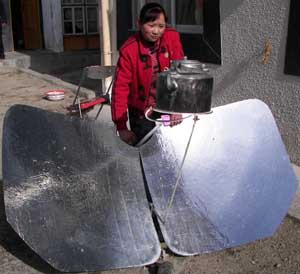|
CHO
OYU 2006 ~ EVEREST 2004 A Team of International Friends Helping Amputees Change the World |
|||||
|
Home
|
Press
| Team | Our Story
| Goals | Journal
| Everest Success | What's
Next? | Our Mission | Friends
| Sponsors | Contact
us | Contribute
| Search
|
|||||
Expedition Journal ~ Leaving Cho Oyu, arranging for transport of team and equipment"Clip
in" and follow along with our
|
|||||
| Special thanks to our sponsor I-LINX of Washington, DC for their generous communication logistics support of our expedition. |
Updated by Linda McMillan
Tuesday, April 25,
2006
Back at Chinese Base Camp; Team finalizes last details of equipment
and logistics back to US and Nepal
In the early morning, before breakfast, I unexpectedly received a note from Tom sent from CBC. The note advising that I needed to descend to Chinese Base Camp as soon as possible. Some kind of issue has arisen with our ground transport, and our plans have again changed dramatically. For reasons not fully explained, our US team members need to leave immediately in Mr. Dorjee's Landcruiser right away and drive to Lhasa. Arrangements will be made for our Sherpa members to be driven to the Nepali border.
Mercifully, the Czech expedition currently at Middle Camp very kindly offers me part of their delicious hot breakfast before I leave. But now I face yet another improbable situation. The local yak herder refuses to help me drive the two yaks loaded with my gear unless I pay them some kind of extra payment.
OK, I'm finished with these kinds of tactics. No one in camp seems to be able to convince the yak herder to help me, although just yesterday I donated to him my high-quality glacier glasses which he seemed to appreciate very much. I gave them away figuring I would not need them anymore on this trip, and they could prevent this yak man from developing cataracts in his eyes in the coming years. But that generosity was lost on him today, and all he wanted was more money (although he had already been paid by TMA for his yak and services that day).
Being from Texas, with decades of experience dealing with creatures like horses and cattle, I respond to his demand by announcing to the whole camp that OK then I'll just drive the loaded yaks myself to Chinese Base Camp (CBC). No big effort there, as it's basically downhill all way to CBC, so I should be able to keep up with the yaks despite being pathetically weak aerobically.
Tibetans and trekkers watch in stunned silence while I round up the yaks and use my trekking poles to get them started down the hill. It's actually quite pleasant for the two hours with just me and the yaks plodding down the snowy, icy trail. No one to worry about. Just have to get to the camp. But as the yaks and I got closer to CBC, I noticed that one of the energetic young yak herders had caught up with us, and had taken over minding the yaks. Actually, that was fortuitous as suddenly one of the yaks decided to leave the path and march up a snowy hill to no particular destination. I was too out of breath to race up the hill after him and make him descend. But the young yak herder had no problem zipping up the slope and getting the yak back on the path.
All seemed OK until the yak herder suddenly tried to grab my trekking poles out of my hands. I guess he wanted to try them, or take them for himself. He seemed like a typically impulsive young teenager. But this was not the right day for someone to grab my gear. So I just grabbed them back from him and made him walk in front of me, not beside or behind me.
About a hour later I noticed a car coming up this road, past where I thought vehicles were allowed to go. As I came upon a small bridge, the car was waiting for me. It was the wonderful Mr. Dorjee and his team from Chinese Base Camp. They knew I was on this road and drove up to get me and my gear. This saved me lots of walking and was appreciated once I realized I was not going to be charged any extra fee for this service.
In a few minutes we arrived at CBC where I was ushered into the big Tibetan tea lodge tent. There all the team was assembled around the room, facing each other across the expanse of the tent. It felt a bit like being ushered into a medieval meeting of King Arthur's Knights of the Round Table. Tom then proceeded to tell me all the final arrangements he had made with all our team members and Mr. Dorjee. All the important details had been already discussed and addressed. There was nothing for me to do but listen to this final disposition of our Cho Oyu expedition and our team.
Unexpectedly fast arrangements had been made at CBC by Mr. Dorjee to have our US team members driven to Lhasa immediately. Nepali team members are to be driven to the Nepali border tomorrow, where they take ground transport on to Kathmandu.
Well, that's that. Nothing left to do but say goodbye to our Sherpa team members and wish them a safe journey home. We also thank Mr. Dorjee and his team once again for being so professional and helpful in providing services for our team. The last detail to attend to falls to me. It seems one of the yaks that carried our expedition loads up to ABC suffered some problems on the way down and died en route. The owner of the yak is a very poor Tibetan who only owns two yaks. So Mr. Dorjee suggested that normal protocol in these matters asks that the expedition pay half the cost of a replacement yak for this herder, about $120 US is our share. Having no way to verify this information, we choose to trust Mr. Dorjee's suggestions on this. I hand over the money to the humble yak herder (who was able to produce the head of his yak as evidence of death!).
The yak herder cups his hands around the dollars gently. He puts the money on the table and grabs both of my hands to thank me profusely for this payment. This obviously means a very great deal to him, and he seems genuine in his gratitude. We are happy to help make his hard life just a little bit easier. No matter what our disappointments are to not make it up Cho Oyu, we realize this is nothing compared to what these Tibetans who serve the expeditions must endure every year.
We left immediately by Landcruiser, headed for Lhasa. After hours of the bone-rattling roads, we opted to stop in the lovely city of Shigatse instead of pressing on the Lhasa. The roads ahead had become icy from new storms. Better to start again in the morning.
Wednesday, April 26,
2006
US team members travel north to Lhasa; Nepali team members head
to Nepali border and Kathmandu
Today Pete, George, Tom and I continued our ride from Shigatse to Lhasa, where we will stay two nights before flying back to Beijing.
Thursday, April 27,
2006
US team members arrive in Lhasa
Today we enjoyed good weather for a day of sightseeing in Lhasa.
Friday, April 28,
2006
US team members visit special places in Lhasa; Nepali members
arrive back in Kathmandu
Today we met with representatives of Tibet Mountaineering Association to finalize issues of equipment and travel for the expedition. We also heard that our Nepali team members had arrived safely back in Kathmandu, now enjoying some relief from the political crises that plagued Nepal while we were all in Tibet.
[ahead to next Journal section]
[back to Journal home page]

We will miss being around the proud, gentle, and extremely resilient people of Tibet
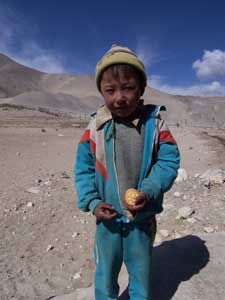
Shigatse is a nice small city with a very large, beautiful monastery that is currently being restored. In ancient times, this is where the Panchen Lama ruled.
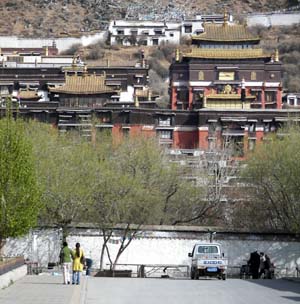
Our small hotel in Shigatse has an impressively decorated lobby reflecting the wealth of this area.
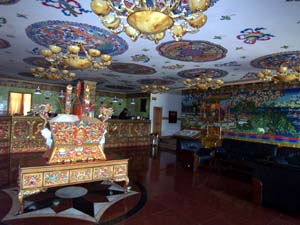
The hotel in Shigatse also offered a valuable service to travelers--thoroughly cleaning your vehicle inside and outside to remove the dust and debris from the hundreds of miles of dirt and rock roads you have driven to get here.
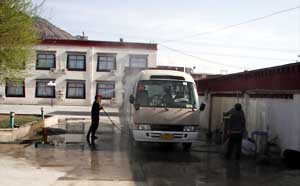
The hotel in Shigatse also cleverly uses a variety of energy-saving devices, including three of these highly effective and inexpensive solar ovens stationed outside the dining room to supply the constant need for hot water for tea. We noticed these solar ovens and other solar devices being used in many homes and villages we passed. Tibet might not have much water, but they are very rich in solar energy potential.
